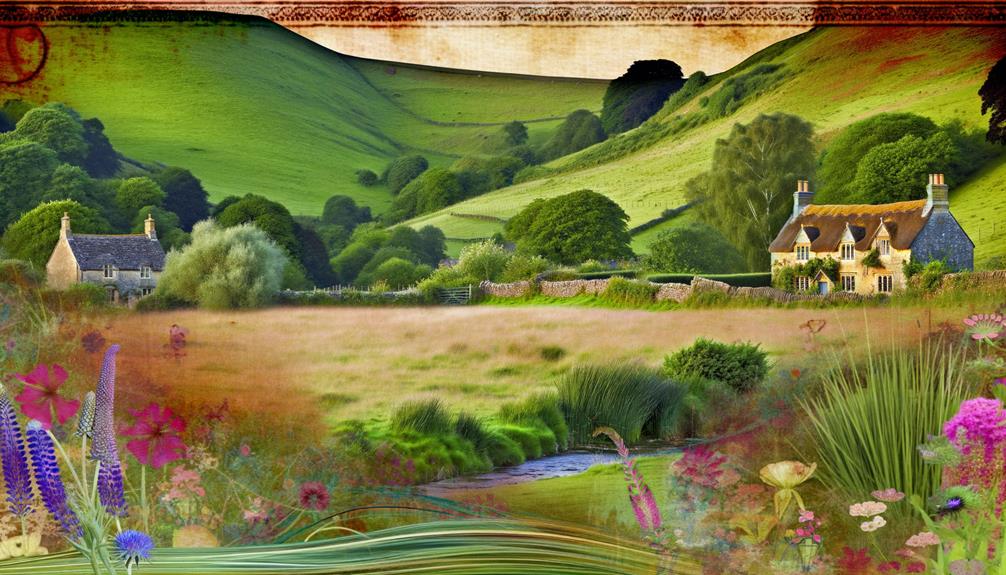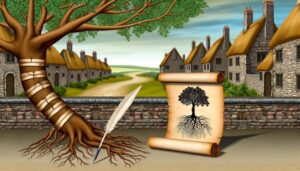Beverly Name Meaning and Origin
Beverly is an English name rooted in Old English, derived from 'beofer' meaning beaver and 'leah' meaning meadow. Initially a place name, it refers to Beverley in East Yorkshire, famed for its beaver-filled meadows.
Over time, socio-cultural shifts saw Beverly evolve from a surname to a given name, gaining popularity during the Victorian era and peaking in the 1930s and 1940s. The name also maintained various forms across cultures, such as Beverley in Britain and Béverlie in French contexts.
Explore the intricacies of its etymology, historical context, and cultural significance to understand Beverly's multifaceted legacy.

Key Takeaways
- Beverly originates from Old English terms meaning "beaver meadow."
- The name is derived from the town of Beverley in East Yorkshire, England.
- Initially a surname, Beverly transitioned to a given name influenced by Victorian-era trends.
- Common nicknames include Bev and Lee, reflecting cultural and phonetic preferences.
- Variations like Beverley, Béverlie, and Beverlija showcase its global linguistic adaptations.
Historical Background
Originating in England, the name Beverly can be traced back to a place name derived from the Old English terms 'beofer', meaning beaver, and 'leah', meaning clearing or meadow.
Historically, Beverly was initially associated with the town of Beverley in East Yorkshire. This town, noted for its beaver population and picturesque meadows, provided a geographic reference that eventually evolved into a personal name.
During medieval times, place names were commonly adopted as surnames, reflecting an individual's origin. Over centuries, Beverly evolved from a surname to a given name.
Etymology and Meaning
The name Beverly, rooted in the Old English elements 'beofer' (beaver) and 'leah' (clearing or meadow), encapsulates a vivid imagery of a beaver-inhabited meadow, highlighting its pastoral and naturalistic origins.
Historically, such names were often descriptive, reflecting the geography and fauna of a locale. Analyzing the etymology reveals a rich tapestry of early English life:
- Beofer (Beaver): A symbol of industriousness and resourcefulness, beavers were common in medieval England.
- Leah (Clearing/Meadow): These open spaces were essential for agriculture and settlement.
- Compound Names: Combining flora and fauna with topographical features was a typical practice, offering insight into the environment and societal values of the time.
This etymological blend offers a snapshot of early English environmental interaction.
Beverly as a Place Name
How did the name Beverly evolve from a vivid descriptor of a beaver-inhabited meadow to a prominent place name in various English-speaking regions? Historically, the name “Beverly” finds its roots in Old English, originating from "Beoferlic," which translates to "beaver stream" or "beaver meadow." Over time, this descriptive name became associated with specific locales, particularly in England. The town of Beverley in East Yorkshire, UK, exemplifies this transformation, becoming a notable center during the Middle Ages.
| Region | Place Name | Historical Significance |
|---|---|---|
| England | Beverley, East Riding | Medieval market town |
| United States | Beverly, Massachusetts | Early American settlement |
| Canada | Beverly, Alberta | Historical coal mining community |
| Australia | Beverly Hills, NSW | Suburban development |
| South Africa | Beverly Hills, Durban | Residential area |
Such place names reflect both historical roots and evolving cultural landscapes.
Transition to Given Name
Gradually, the name Beverly changed from its geographical origins to being adopted as a given name, a shift influenced by socio-cultural factors and the romanticization of English place names. This evolution can be attributed to several key developments: Firstly, as the English language and society evolved, there was a growing trend towards using place names as personal names, adding to the appeal of Beverly as a given name. Additionally, the rise of the romanticization of English place names in literature and popular culture further contributed to the transition of Beverly from a geographical reference to a beloved given name. This shift also reflects the broader cultural fascination with the meanings and histories of names, as seen in the popularity of searches for terms like “ashton name meaning. Furthermore, the origins of the name Ashton, like Beverly, also reveal a similar trend of place names being adopted as given names. The name Ashton originally derived from the Old English words “aesc” (ash tree) and “tun” (settlement), indicating a place name meaning “settlement near the ash trees. ” This linguistic and cultural evolution highlights the dynamic nature of names and their ability to reflect and shape societal values and trends. The shift from geographical origins to personal names demonstrates the enduring influence of language, literature, and cultural ideals on the development and transformation of names.
- Literary Influence: The Victorian era saw an increased use of place names in literature, imbuing them with a sense of romance and history.
- Social Mobility: The rise of the middle class led to a desire for distinctive yet genteel names, often derived from picturesque locales.
- Cultural Trends: The 19th and early 20th centuries witnessed a broader trend of adopting surnames and place names as first names, reflecting a blend of tradition and modernity.
These factors collectively facilitated Beverly's transformation into a popular given name.
Popularity Over Time
As Beverly gained traction as a given name, its popularity surged and waned through the decades, reflecting broader societal changes and naming trends.
In the early 20th century, Beverly saw a steady rise, peaking in the 1930s and 1940s when it frequently appeared in the top 100 names for girls in the United States. This period coincided with a cultural shift towards more modern and less traditional names.
However, by the latter half of the 20th century, Beverly's appeal began to decline sharply. The name's usage diminished as newer, trendier names emerged and replaced it.
Today, Beverly is less common, often regarded as a classic or vintage name, echoing a bygone era of naming conventions.
Cultural Significance
In examining the cultural significance of the name Beverly, one must consider its historical associations with the entertainment industry, literature, and notable public figures. Historically, Beverly has been featured prominently in various cultural domains:
- Entertainment Industry: The name Beverly became synonymous with Hollywood glamour, especially during the Golden Age of cinema, where it was often used to evoke a sense of elegance and sophistication.
- Literature: Authors have frequently chosen Beverly for characters to embody traits of resilience and charm, enhancing the narrative's depth.
- Public Figures: The name has been borne by influential individuals whose contributions to society have cemented Beverly as a name of distinction and respect across different sectors.
These aspects collectively underscore the name's enduring cultural resonance.
Famous People Named Beverly
The name Beverly has been borne by several notable individuals who have made significant contributions to the fields of acting and literature.
Among actors, Beverly D'Angelo stands out for her memorable performances in films such as 'National Lampoon's Vacation.'
In the domain of literature, Beverly Cleary has left an indelible mark with her beloved children's books, including the iconic Ramona series.
Notable Beverly Actors
Renowned for their contributions to film and television, several actors named Beverly have left an indelible mark on the entertainment industry. Their achievements span decades, showcasing talent and versatility.
- Beverly Garland: An actress celebrated for her work in television, particularly for her role in the series 'My Three Sons.' Garland's career spanned over five decades, contributing significantly to the evolution of TV.
- Beverly D'Angelo: Known for her role as Ellen Griswold in the 'National Lampoon's Vacation' series, D'Angelo's performances have been pivotal in both comedic and dramatic roles.
- Beverly Todd: Acclaimed for her work in 'Lean on Me' and 'The Bucket List,' Todd has brought depth and nuance to her characters, enriching American cinema.
Their legacies continue to inspire.
Renowned Beverly Writers
Throughout literary history, several writers named Beverly have distinguished themselves through impactful storytelling and profound contributions to literature. Beverly Cleary, perhaps the most renowned, captivated generations with her relatable and endearing children's books, such as the 'Ramona' series. Her works have become cornerstones of juvenile literature, reflecting the ordinary yet profound experiences of childhood.
Another notable figure is Beverly Jenkins, celebrated for her historical romance novels that poignantly explore African American life and love during the 19th century. Jenkins' meticulous research and rich, evocative prose have earned her a dedicated readership and critical acclaim.
Together, these authors exemplify the diverse and significant roles that writers named Beverly have played in enriching the literary landscape.
Variations and Nicknames
Throughout history, the name Beverly has evolved to include a variety of nicknames and unique variations that reflect cultural and linguistic influences.
Common nicknames such as Bev and Bevy have emerged, offering more casual alternatives to the formal name.
Additionally, international adaptations and phonetic variations, like Beverley in British English, illustrate the name's adaptability and enduring appeal across different regions.
Common Beverly Nicknames
How has the name Beverly evolved to encompass a variety of endearing nicknames and diminutive forms over the years? Historically, Beverly, which originated as a surname, has transformed into a beloved given name, subsequently giving rise to affectionate nicknames. These diminutives often reflect both cultural trends and phonetic convenience, allowing for personalization and intimacy.
- Bev: The most common and straightforward diminutive, Bev offers a simple yet affectionate variant.
- Bevy: This playful and slightly whimsical form adds a sense of charm and endearment.
- Lee: While less intuitive, Lee serves as a versatile and gender-neutral option, emphasizing the latter part of Beverly.
These nicknames illustrate how the name Beverly has adapted to meet evolving linguistic and social preferences.
Unique Beverly Variations
Building on the affectionate nicknames derived from Beverly, the name has also inspired a range of unique variations that reflect diverse linguistic and cultural influences.
Historically, Beverly has seen transformations such as Beverley in British contexts, emphasizing its roots in Old English. French adaptations like Béverlie add a touch of continental flair, while Slavic versions such as Beverlija provide a distinct phonetic twist.
Additionally, diminutives like Bev and Verlie offer more casual, intimate alternatives. These variations not only exhibit the adaptability of the name across different cultures but also highlight its enduring appeal.
Understanding these shifts helps appreciate Beverly's rich etymological journey, illustrating how names evolve to mirror societal and linguistic trends over time.
Conclusion
To sum up, the name Beverly has evolved from a place name of Old English origin to a popular given name, reflecting societal changes over time. Its etymology denotes a meadow of beavers, symbolizing industriousness and adaptability.
Popularity trends have fluctuated, yet the name retains cultural significance and is borne by numerous notable individuals. As the adage goes, 'What's in a name?'—in Beverly's case, a rich tapestry of history, meaning, and cultural resonance is evident.






